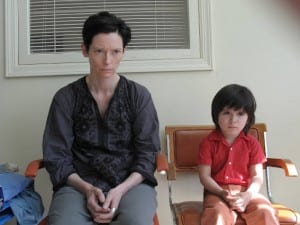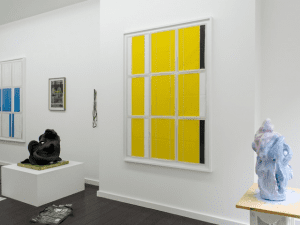Review by Katerina Valdivia Bruch
Initiated by the mayor of Berlin, Klaus Wowereit, the exhibition Based in Berlin caused some controversy before its opening on 7 June, 2011. The mayor’s decision to hold a Leistungsschau junger Kunst aus Berlin (Showcase Exhibition of Young Berlin Art) so close to elections in Berlin firstly raised a few eyebrows. Other contentious issues included the long-standing calls from art practitioners for a permanent Kunsthalle in the city and the selection of the curatorial team. More than 2,300 people signed a petition letter to the mayor asking for a revision of the project. Nevertheless, the opening was a huge success overall, with hordes of art lovers, curators, art critics, artists and other art practitioners waiting in line to enter the main venue at Atelierhaus Monbijou, temporarily in use before its demolition.
At €1.4 million, the cost of holding the exhibition was extraordinarily high considering it was a single show featuring mostly unknown artists. The decision to invest this kind of money is even more questionable in light of Berlin’s dire financial situation and unemployment rate, which is one of the highest in Germany. In spite of the unique opportunity to create a platform for emerging artists, most of the works in the exhibition are fairly unremarkable and do nothing to challenge the viewer. Several artists, however, used the mayor’s charismatic flair as a motif in their works and humorously portrayed the losers of the last election campaign, as can be seen in the photographs of the artist duo Jay Chung & Q Takeki Maeda at Atelierhaus Monbijou, or the homage-like portrait to Berlin’s mayor, Allegory of Government, in an empty room at KW-Institute for Contemporary Art Berlin by Clegg & Guttmann.
Organised by a team of five young curators, Angelique Campens, Fredi Fischli, Magdalena Magiera, Jakob Schillinger and Scott Cameron Weaver, with the support of three renowned advisors, Klaus Biesenbach, Director of PS1 and Chief Curator of MoMa in New York, Christine Macel, Chief Curator of the Centre Pompidou in Paris, and Hans Ulricht Obrist, Co-Director of Serpentine Gallery in London, the exhibition showcases the work of 80 artists from 26 different countries, who have chosen Berlin as their base. The process of selecting the work involved an open call with 1,250 artists submitting portfolios and around 500 studio visits.
The majority of the works demonstrate the diversity of Berlin’s international art scene, featuring current shooting-stars, such as Israeli Keren Cytter, who was shortlisted for the Prize for Young Art at the Neue Nationalgalerie in 2009, Cyprien Gaillard from France, who recently had a solo show at KW-Berlin and Singaporean Ming Wong, whose work was showcased at the last Venice, Gwangju and Singapore Biennales. We also had another chance to see work by artists who were part of the last Berlin Biennale, such as Danish-Vietnamese artist Danh Vo and Petrit Halilaj from Kosovo.
Based in Berlin also includes the presentation of artist-run spaces or project rooms. It features a number of parallel activities with film screenings, talks, conferences, workshops, open-air concerts and performances, in which visitors are encouraged to discuss and exchange their ideas with artists, members of the project rooms, art critics and curators.
With more than 400 art galleries, Berlin attracts many artists, drawn by its affordable living conditions and its ample space for art production. Artists rent huge studios in different areas all over the city, something inconceivable in other European capital cities. There is a tendency to compare Berlin with the New York of the seventies, although I believe that the quality of work produced in New York during that period was more cutting-edge in contrast to a fair number of rather laid-back Berlin-based artists. Berlin is a cheap city with galleries springing up everywhere and collectors frequently coming to town, so why bother to go the extra mile, as it were? In fact, the closed artist community does not even need to integrate and artists tend to communicate in English rather than in German. Berlin is more a place of transit, an inspiring place for creation, but not for earning money. And, because Berlin is “poor, but sexy” – to quote Mr. Wowereit – the artists produce work in Berlin, but usually sell it abroad or in other German cities. So who are the winners at the end of the day? The artists, the mayor or the city?
Based in Berlin continues until 24 July
Various venues: Atelierhaus Monbijou, KW-Berlin, Berlinische Galerie, NBK and Hamburger Bahnhof Museum
basedinberlin.com
Aesthetica Magazine
We hope you enjoying reading the Aesthetica Blog, if you want to explore more of the best in contemporary arts and culture you should read us in print too. In the spirit of celebration, Issue 41 includes a piece on Guggenheimn Bilbao where the Luminous Interval features internationally acclaimed artists such as Louise Bourgeois, Kiki Smith and Damien Hirst, ArtAngel’s new commission at MIF, Bruce Nauman’s retrospective at The Kunsthalle Mannheim and Cory Arcangel’s Pro Tools at the Whitney in NYC. You can buy it today by calling +44(0)1904 479 168. Even better, subscribe to Aesthetica and save 20%. Go on, enjoy!
Video:
Sunah Choi
Composition T
Courtesy the artist




